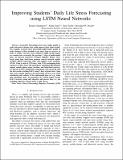| dc.contributor.author | Umematsu, Terumi | |
| dc.contributor.author | Sano, Akane | |
| dc.contributor.author | Taylor, Sarah E. | |
| dc.contributor.author | Picard, Rosalind W. | |
| dc.date.accessioned | 2021-12-14T16:17:28Z | |
| dc.date.available | 2021-11-01T18:08:06Z | |
| dc.date.available | 2021-12-14T16:17:28Z | |
| dc.date.issued | 2019 | |
| dc.identifier.uri | https://hdl.handle.net/1721.1/137020.2 | |
| dc.description.abstract | © 2019 IEEE. Accurately forecasting stress may enable people to make behavioral changes that could improve their future health. For example, accurate stress forecasting might inspire people to make changes to their schedule to get more sleep or exercise, in order to reduce excessive stress tomorrow night. In this paper, we examine how accurately the previous N-days of multi-modal data can forecast tomorrow evening's high/low binary stress levels using long short-Term memory neural network models (LSTM), logistic regression (LR), and support vector machines (SVM). Using a total of 2,276 days, with 1,231 overlapping 8-day sequences of data from 142 participants (including physiological signals, mobile phone usage, location, and behavioral surveys), we find the LSTM significantly outperforms LR and SVM with the best results reaching 83.6% using 7 days of prior data. Using time-series models improves the forecasting of stress even when considering only subsets of the multi-modal data set, e.g., using only physiology data. In particular, the LSTM model reaches 81.4% accuracy using only objective and passive data, i.e., not including subjective reports from a daily survey. | en_US |
| dc.description.sponsorship | National Institute of Health (Grant R01GM105018) | en_US |
| dc.language.iso | en | |
| dc.publisher | Institute of Electrical and Electronics Engineers (IEEE) | en_US |
| dc.relation.isversionof | 10.1109/BHI.2019.8834624 | en_US |
| dc.rights | Creative Commons Attribution-Noncommercial-Share Alike | en_US |
| dc.rights.uri | http://creativecommons.org/licenses/by-nc-sa/4.0/ | en_US |
| dc.source | MIT web domain | en_US |
| dc.title | Improving Students' Daily Life Stress Forecasting using LSTM Neural Networks | en_US |
| dc.type | Article | en_US |
| dc.identifier.citation | Umematsu, Terumi, Sano, Akane, Taylor, Sara and Picard, Rosalind W. 2019. "Improving Students' Daily Life Stress Forecasting using LSTM Neural Networks." 2019 IEEE EMBS International Conference on Biomedical and Health Informatics, BHI 2019 - Proceedings. | en_US |
| dc.contributor.department | Massachusetts Institute of Technology. Media Laboratory | en_US |
| dc.contributor.department | Program in Media Arts and Sciences (Massachusetts Institute of Technology) | en_US |
| dc.relation.journal | 2019 IEEE EMBS International Conference on Biomedical and Health Informatics, BHI 2019 - Proceedings | en_US |
| dc.eprint.version | Author's final manuscript | en_US |
| dc.type.uri | http://purl.org/eprint/type/ConferencePaper | en_US |
| eprint.status | http://purl.org/eprint/status/NonPeerReviewed | en_US |
| dc.date.updated | 2021-07-06T14:22:05Z | |
| dspace.orderedauthors | Umematsu, T; Sano, A; Taylor, S; Picard, RW | en_US |
| dspace.date.submission | 2021-07-06T14:22:06Z | |
| mit.license | OPEN_ACCESS_POLICY | |
| mit.metadata.status | Publication Information Needed | en_US |
